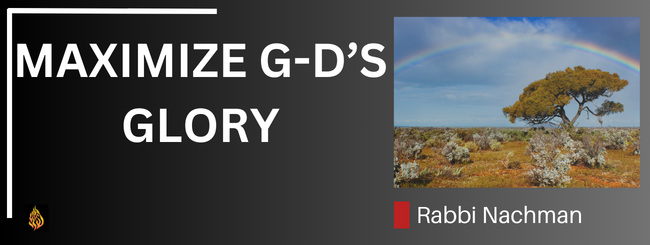Rabbi Nachman teaches,
Every person must minimize his own glory and maximize G-d’s glory. For one who pursues glory attains not G-d’s glory but only the glory of kings, of which it is said: “The glory of kings is subject to investigation” (Proverbs 25:2) . For then everyone investigates who he really is, asking: “Who is he and what is he to be given such honor?” People challenge him, saying he is not fit for this honor.
But when a person flees from honor, minimizing his own honor and maximizing the glory of G-d, he attains the glory of G-d. No one then investigates to see if he deserves it, for “The glory of G-d is to hide the matter” ( ibid. ) – it is forbidden to question his honor.
The only way to attain G-d’s glory is through repentance. And the true sign of a person who has returned to G-d is the ability to hear himself insulted and remain silent. He endures even the most murderous abuse with patience, thereby reducing the blood in the left side of his heart (seat of the animal soul) and annihilating his evil inclination. Such a person is worthy of a share in God’s glory.
Before a person returns to G-d, he has no being. It is as if he has not yet been created, because it would have been better for him not to have been created at all. But when he purifies himself in order to return to G-d, he puts himself in order and prepares to become a being. This element of preparation for becoming – coming into being, as it were – explains why the Divine Name associated with repentance is Ehyeh , “I shall be”.
When a person wants to purify himself and return to G-d, they tell him “Wait!” ( Yoma 38b-39a). It is true that he should hurry to free his soul and escape the darkness. But he should not allow himself to become discouraged and dejected if he sees that he is far from true prayer and other holy devotions. Waiting patiently is a necessary part of the process. In the end he will be worthy of making amends completely and everything will be rectified.
Repentance never comes to an end: it must be continuous. Even at the very moment that a person is confessing , it is impossible for him to say the words , “I have sinned, I have transgressed, I have rebelled.” with perfect sincerity free of all extraneous motives. Thus he must repent for his earlier repentance and for the flaw in his previous confession.
Even when a person knows that he has repented completely, he must still make amends for his earlier repentance. For what he achieved then was good only in proportion to his perception of G-dliness at the time. Now, after his repentance, his perception has undoubtedly been heightened. Compared with his present perception, his earlier perception turns out to have been grossly materialistic. He must therefore repent for his earlier levels – because he degraded the true exaltedness of the Creator to the level of the material. Happy is the man who achieves true Teshuvah.
Teshuvah has three aspects: seeing with the eyes, hearing with the ears and understanding in the heart (cf. Isaiah 6:10 ) . A person must use his eyes to look towards the ultimate goal and purpose of this world. He must concentrate on this goal with all his heart, resolving to travel there and nowhere else. And he must use his ears to listen carefully to everything that our holy sages said. Then he will be able to return to G-d.
Teshuvah essentially depends on humility. One must make oneself into nothing, like a wasteland over which people trample: one must pay no attention whatsoever to opposition or abuse from others. One should train oneself to be silent and hear oneself insulted without answering back. Such a person is worthy of the name “wise” and will attain perfect Teshuvah, the “Crown” and summit of the Sefirot. This is the way to true and enduring glory – the glory of G-d.
Likutey Moharan I , 6
Have a blessed week!
With permission taken from: Daily Dose Of Rabbi Nachman
© Copyright, all rights reserved. If you enjoyed this article, we encourage you to distribute it further.
Our blogs may contain text/quotes/references/links that include copyright material of Mechon-Mamre.org, Aish.com, Sefaria.org, Chabad.org, and/or AskNoah.org, which we use in accordance with their policies.
